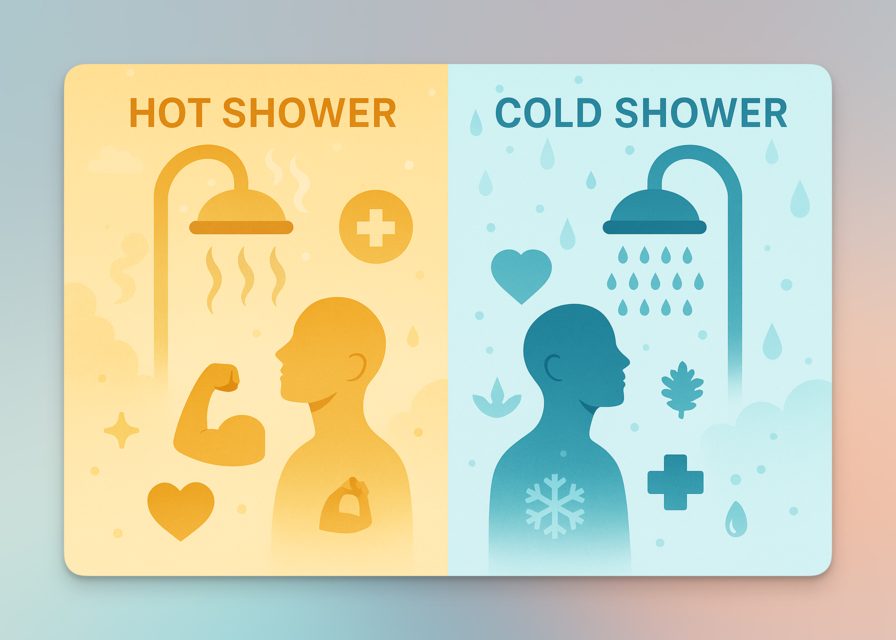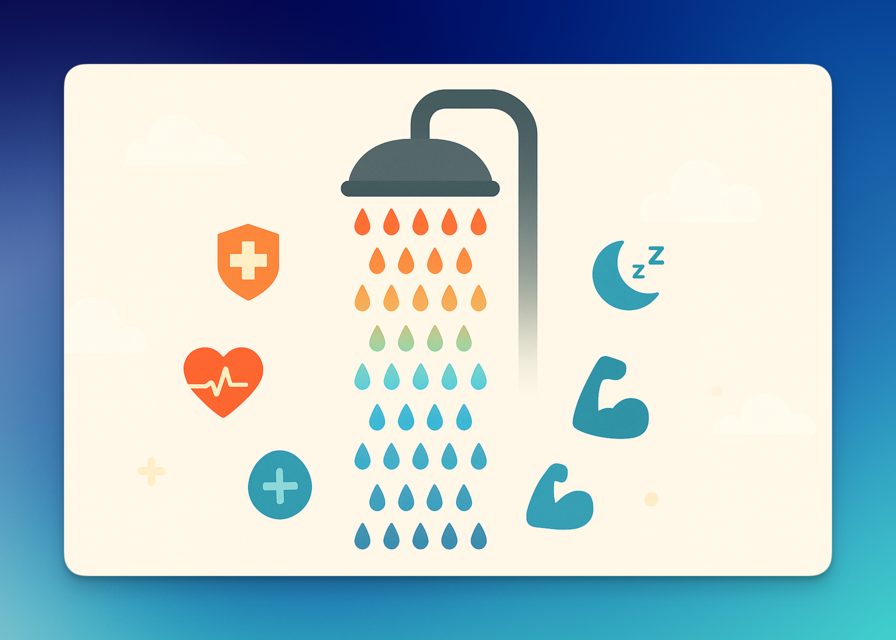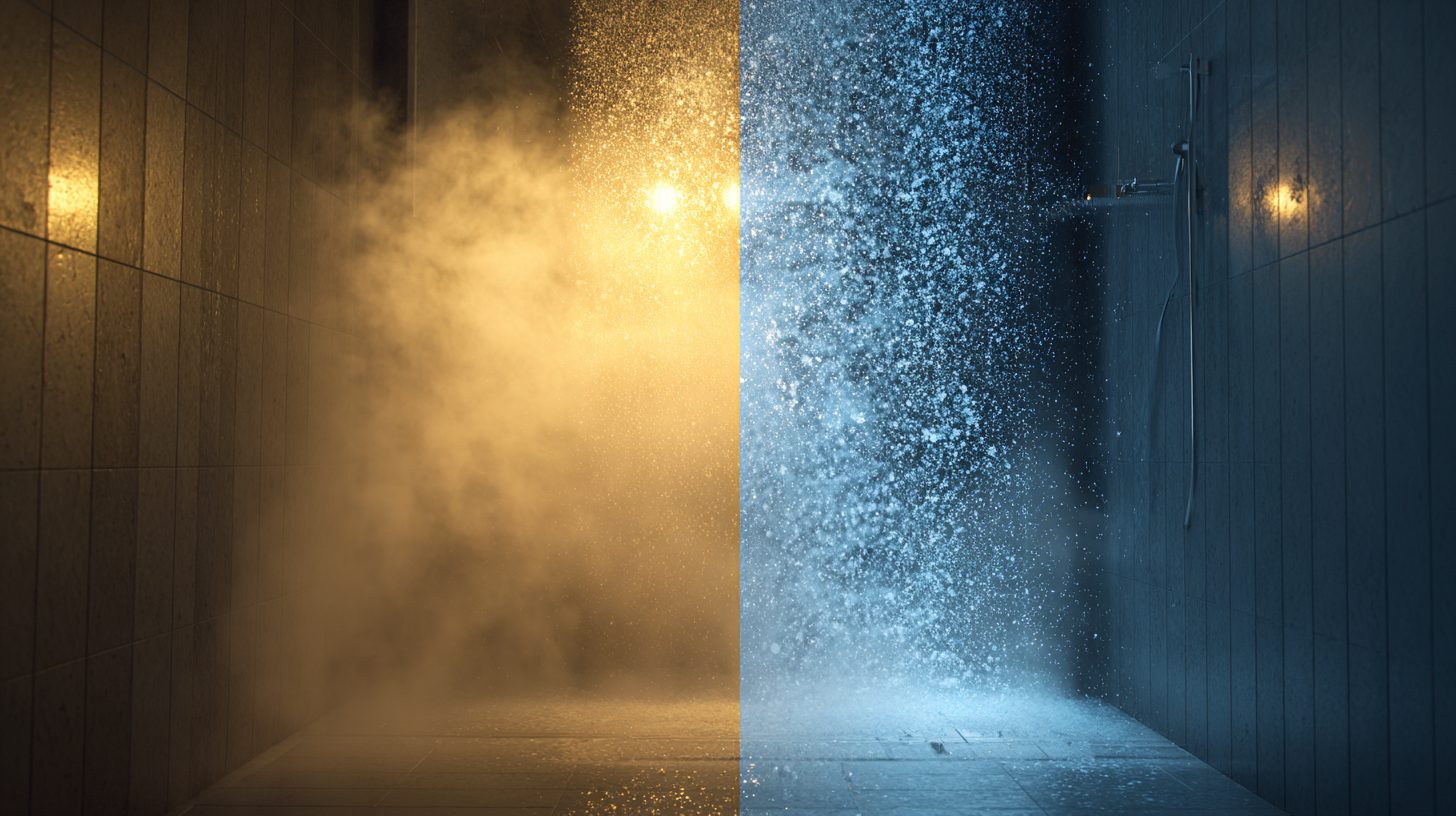Most people reach for the hot water handle without thinking twice. However, science suggests you might be missing out on significant health benefits by avoiding cold water. The debate between hot shower vs cold shower isn’t just about comfort—it’s about optimizing your health, immunity, and overall wellbeing.
Recent studies show that people who take cold showers reduce their sick days by 29% compared to hot shower users. Meanwhile, hot showers provide their own unique benefits for sleep, muscle recovery, and stress relief. Therefore, understanding when to use each temperature can transform your daily routine into a powerful health tool.
Why Shower Temperature Matters for Your Health
Your body responds dramatically to different water temperatures, triggering various physiological responses that affect everything from your immune system to your mental health. Furthermore, these responses aren’t just temporary—regular exposure to specific temperatures can create lasting health improvements.
The Science Behind Temperature Therapy
Water therapy (hydrotherapy) has been used for centuries to harness our body’s natural adaptation mechanisms. When you expose your body to temperature extremes, it activates your autonomic nervous system, releases specific hormones, and triggers beneficial stress responses called hormesis.
Cold water exposure activates your sympathetic nervous system—your body’s “fight or flight” response. This temporarily increases heart rate, blood pressure, and metabolic activity while releasing hormones like norepinephrine and dopamine.
Hot water exposure activates your parasympathetic nervous system—your body’s “rest and digest” mode. This promotes relaxation, increases circulation, and helps lower cortisol levels.
Cold Shower Benefits: What Science Actually Shows

1. Immune System Strengthening
The most compelling research on cold shower benefits comes from a large-scale study involving 3,018 participants. Those who ended their hot showers with 30-90 seconds of cold water for 30 consecutive days experienced 29% fewer sick days from work compared to the control group.
How It Works:
- Cold water stimulates leukocytes (white blood cells that fight infection)
- Additionally, it increases circulation, helping immune cells move more efficiently
- The stress response strengthens your body’s natural defense mechanisms
2. Mental Health and Mood Enhancement
Cold shower benefits extend significantly to mental wellbeing. Research shows that cold water exposure can help combat depression and anxiety through several mechanisms:
Mood Benefits:
- Triggers endorphin release, creating natural mood elevation
- Increases levels of norepinephrine and dopamine
- Meanwhile, provides a sense of accomplishment and mental resilience
- May reduce symptoms of depression (though more research is needed)
One study found that participants taking twice-daily cold showers reported decreased depressive symptoms over several months.
3. Enhanced Circulation and Recovery
Athletes and fitness enthusiasts increasingly use cold therapy for recovery. Cold shower benefits for circulation include:
Physical Benefits:
- Constricts blood vessels initially, then causes vasodilation
- Reduces inflammation and muscle soreness
- Furthermore, may speed recovery from exercise
- Improves overall circulation throughout the body
Research shows athletes who used cold water therapy (54°F to 59°F) after exercise reported less muscle soreness than those who didn’t.
4. Skin and Hair Health
Cold water provides beauty benefits that hot water can’t match:
Cosmetic Advantages:
- Tightens pores and reduces their appearance
- Preserves natural oils in skin and hair
- Additionally, seals hair cuticles for shinier, healthier-looking hair
- May reduce skin inflammation and puffiness
Hot Shower Benefits: The Comfort with Purpose
1. Sleep Quality Improvement
Hot shower benefits shine when it comes to sleep preparation. Research indicates that taking a hot shower 1-2 hours before bedtime can significantly improve sleep quality.
Sleep Enhancement Mechanisms:
- Raises body temperature, then allows natural cooling
- The temperature drop signals your body to prepare for sleep
- Meanwhile, promotes relaxation through parasympathetic activation
- Reduces muscle tension that might interfere with rest
2. Muscle Relaxation and Pain Relief
Hot water excels at soothing physical discomfort:
Therapeutic Benefits:
- Increases blood flow to muscles and joints
- Reduces stiffness, particularly beneficial for arthritis sufferers
- Furthermore, helps relieve muscle tension after long days
- Provides natural pain relief through heat therapy
3. Stress Reduction
Hot shower benefits include significant psychological advantages:
Mental Wellness:
- Lowers cortisol (stress hormone) levels
- Promotes relaxation response
- Additionally, provides meditative, mindful experience
- Creates sense of comfort and security
4. Detoxification Through Sweating
Hot water helps your body’s natural cleansing processes:
Cleansing Benefits:
- Opens pores to release trapped dirt and oil
- Promotes sweating, which eliminates toxins
- Meanwhile, improves skin appearance and health
- Supports your body’s natural detoxification pathways

Hot Shower vs Cold Shower: When to Choose Each
Morning Routines: Cold Shower Advantages
Cold showers work exceptionally well in the morning because they:
- Increase alertness and focus
- Boost energy levels naturally
- Furthermore, kickstart your metabolism
- Prepare your immune system for the day ahead
Morning Cold Shower Protocol:
- Start with warm water for 1-2 minutes
- Gradually decrease temperature
- End with 30-90 seconds of cold water (50-60°F)
- Meanwhile, focus on deep breathing to manage discomfort
Evening Routines: Hot Shower Benefits
Hot showers are ideal for evening routines because they:
- Prepare your body for sleep
- Relax tense muscles from daily activities
- Additionally, provide stress relief after demanding days
- Create calming transition to bedtime
Evening Hot Shower Protocol:
- Keep water temperature warm but not scalding (95-105°F)
- Limit shower time to 10-15 minutes
- Take shower 1-2 hours before intended bedtime
- Furthermore, follow with cool room temperature for better sleep
Post-Workout: The Strategic Choice
Choose Cold Showers After:
- Intense cardio workouts
- High-intensity interval training
- Additionally, any exercise causing significant muscle inflammation
- Summer workouts when you’re overheated
Choose Hot Showers After:
- Strength training with muscle stiffness
- Cold weather outdoor activities
- Meanwhile, when you need general relaxation and stress relief
- Yoga or stretching sessions
The Best of Both: Contrast Shower Therapy
Many health experts recommend combining hot shower vs cold shower benefits through contrast therapy:
Contrast Shower Protocol
The Method:
- Start with 3 minutes of hot water (95-105°F)
- Switch to 30-60 seconds of cold water (50-65°F)
- Repeat cycle 2-3 times
- Additionally, always end with cold water
Contrast Shower Benefits
Why It Works:
- Maximizes circulation through vessel constriction and dilation
- Combines immune system benefits with muscle relaxation
- Furthermore, provides mental resilience training
- May accelerate recovery more than either temperature alone
UCLA Health athletic trainers often recommend contrast showers post-workout, noting improved recovery and reduced muscle soreness.
Safety Considerations: Who Should Avoid Cold Showers
Medical Conditions Requiring Caution
Consult Your Doctor Before Cold Showers If You Have:
- Heart disease (cold shock may stress the cardiovascular system)
- Raynaud’s syndrome (affects blood flow to fingers and toes)
- Cold urticaria (allergic reaction to cold temperatures)
- Additionally, if you’re pregnant (effects aren’t well understood)
Hot Shower Precautions
Be Careful With Hot Showers If You Have:
- Eczema or psoriasis (hot water can worsen these conditions)
- Very sensitive skin
- Meanwhile, cardiovascular issues (hot water can affect blood pressure)
- Tendency toward dizziness or fainting
Optimizing Your Shower Routine for Maximum Benefits
Starting Your Cold Shower Journey
Week 1-2: Gradual Introduction
- End regular showers with 15-30 seconds of cooler water
- Focus on controlled breathing during cold exposure
- Additionally, gradually decrease temperature each day
Week 3-4: Building Tolerance
- Extend cold exposure to 60-90 seconds
- Try starting with lukewarm rather than hot water
- Furthermore, practice positive self-talk during discomfort
Month 2+: Advanced Practice
- Work up to 2-3 minutes of cold water
- Experiment with full cold showers
- Meanwhile, consider contrast shower protocols
Maximizing Hot Shower Benefits
Temperature Guidelines:
- Keep water warm, not scalding (95-105°F maximum)
- Limit shower time to prevent skin dryness
- Additionally, moisturize immediately after showering
Timing Considerations:
- Morning hot showers for muscle stiffness
- Evening hot showers for sleep preparation
- Furthermore, post-workout hot showers for general relaxation
Special Populations: Tailored Recommendations
Athletes and Fitness Enthusiasts
For Endurance Athletes:
- Cold showers after cardio sessions
- Hot showers after strength training
- Meanwhile, contrast showers for comprehensive recovery
For Weekend Warriors:
- Cold therapy for acute injuries or inflammation
- Hot therapy for muscle stiffness and soreness
- Additionally, listen to your body’s specific needs
Older Adults
Benefits for Seniors:
- Hot showers may help with arthritis stiffness
- Cold showers might boost cognitive function
- Furthermore, contrast therapy could improve circulation
Safety First:
- Start with gentler temperature variations
- Install grab bars and non-slip surfaces
- Meanwhile, consult healthcare providers about individual risks
Individuals with Chronic Pain
Pain Management Applications:
- Hot showers for fibromyalgia symptoms
- Cold therapy for inflammatory conditions
- Additionally, contrast therapy for complex pain patterns
For comprehensive health management, consider Patient Notes AI to track your wellness routines and share insights with healthcare providers during consultations.
The Environmental and Practical Perspective
Energy Considerations
Cold Shower Advantages:
- Reduced energy costs for water heating
- Lower environmental impact
- Meanwhile, faster shower times save water
Hot Shower Considerations:
- Higher energy consumption
- Potential for longer, wasteful showers
- Furthermore, greater environmental footprint
Making Sustainable Choices
Eco-Friendly Strategies:
- Limit hot shower duration
- Use efficient water heating systems
- Additionally, combine temperature benefits strategically
- Install low-flow shower heads
Common Myths About Hot Shower vs Cold Shower
Myth 1: Cold Showers Burn Significant Calories
Reality: While cold exposure slightly increases metabolism, the calorie burn is minimal. Don’t expect cold showers to replace exercise for weight management.
Myth 2: Hot Showers Always Damage Skin
Reality: Moderate temperature hot showers (not scalding) can benefit circulation and muscle relaxation. The key is avoiding extreme temperatures and limiting duration.
Myth 3: You Must Choose One Temperature
Reality: Contrast therapy combining both temperatures often provides superior benefits. Meanwhile, different situations call for different approaches.
Building Your Personal Shower Strategy
Assess Your Goals
For Immune Support: Incorporate 30-90 seconds of cold water daily For Sleep Improvement: Take hot showers 1-2 hours before bedtime
For Athletic Recovery: Use cold therapy after intense workouts For Stress Relief: Additionally, rely on hot showers during high-stress periods
Track Your Results
Monitor These Factors:
- Sleep quality improvements
- Energy levels throughout the day
- Frequency of minor illnesses
- Meanwhile, overall mood and stress levels
- Skin and hair health changes
Adjust Based on Seasons
Winter Considerations:
- Hot showers may feel more necessary for warmth
- Cold therapy still provides immune benefits
- Furthermore, contrast showers offer year-round advantages
Summer Applications:
- Cold showers provide natural cooling
- Post-exercise cold therapy feels more comfortable
- Additionally, hot showers might be reserved for specific therapeutic needs
The Future of Temperature Therapy
Emerging Research
Scientists continue investigating temperature therapy applications:
- Potential benefits for neurodegenerative diseases
- Applications in mental health treatment
- Meanwhile, optimization of athletic performance protocols
Technology Integration
Modern Developments:
- Smart shower systems with programmable temperatures
- Wearable devices tracking physiological responses
- Furthermore, apps for monitoring health improvements
For healthcare providers interested in tracking patient wellness routines, explore our comprehensive guide to clinical documentation to better understand patient health patterns.
Making the Right Choice for You
The hot shower vs cold shower debate doesn’t have a universal winner. Instead, the optimal choice depends on your individual health goals, medical conditions, and lifestyle factors.
Key Takeaways:
- Cold showers excel at immune support and morning energy
- Hot showers are superior for sleep preparation and muscle relaxation
- Contrast showers may provide the best of both worlds
- Meanwhile, individual medical conditions should guide your decisions
Your Action Plan:
- Assess your current health goals and challenges
- Consult healthcare providers about any medical concerns
- Start gradually with temperature changes
- Additionally, track your results over 30-60 days
- Adjust your routine based on what works best
Both hot and cold showers offer legitimate health benefits backed by scientific research. Rather than choosing sides in the hot shower vs cold shower debate, consider how each temperature can serve your specific needs throughout different times and situations.
The key is consistency and gradual adaptation. Start with small temperature changes, listen to your body, and build a routine that supports your overall health and wellbeing. Whether you prefer the invigorating shock of cold water or the soothing comfort of heat, you’re making a positive choice for your health.



